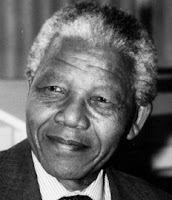Saturday, December 12, 2009
Truth and Reconciliation
South Africa is no longer the country it was when we adopted the Interim Constitution in 1993, when together we resolved to overcome the legacy of our violent and inhuman past.
Out of that negotiation process emerged a pact to uncover the truth, the better to build a bright future for our children and grandchildren, without regard to race, culture, religion or language.
Today we reap some of the harvest of what we sowed at the end of a South African famine.
[Tribute to those who "opened wounds of guilt.]" And so as we observe this stage of the TRC process, we should pay tribute to the 20,000 men and women who relived their pain and loss in order to share it with us; the hundreds who dared to open the wounds of guilt so as to exorcise it from the nation's body politic; indeed the millions who make up the South African people and who made it happen so that we could indeed become a South African nation. …
[Report reawakens "troubling emotions."] Though the interim report is formally given to me as president, it is in reality a report to all of us.
For that reason it is being released to the public and given to our elected representatives without a moment's delay.
Its release is bound to reawaken many of the difficult and troubling emotions that the hearings themselves brought.
Many of us will have reservations about aspects of what is contained in these five volumes.
All are free to make comment on it and indeed we invite you to do so.
And for those who feel unjustly damaged, there are remedies.
[No instant reconciliation.] The commission was not required to muster a definitive and comprehensive history of the past three decades.
Nor was it expected to conjure up instant reconciliation.
And it does not claim to have delivered these either.
Its success in any case depended on how far all of us co-operated with it.
Yet we are confident that it has contributed to the work in progress of laying the foundation of the edifice of reconciliation.
Commentary: South Africa adopted a powerful ethical process, truth and reconciliation, to break the cycle of oppression and violence--the ugly legacy of apartheid. The notion of reconciliation has Christian overtones, as it seeks to restore estrangement. (In the Catholic tradition the Sacrament of Reconciliation involves confession and repentance.) Through reconciliation a relationship out of balance is ultimately restored. Truth-telling, by both parties, is the beginning. This mutual telling and being heard/understood triggers the process. (Think of the adage, "the truth will set you free.") In this regard truth is a moral force, like love, that transforms not only individuals but societies.
Search yourself: Have you exerienced the transformative power of truth: 1) as a truth teller and 2) a truth hearer? Remembering Sisela Bok's insights into Lying, what are the practical, corrosive consequences of not telling the truth?
Subscribe to:
Comments (Atom)


